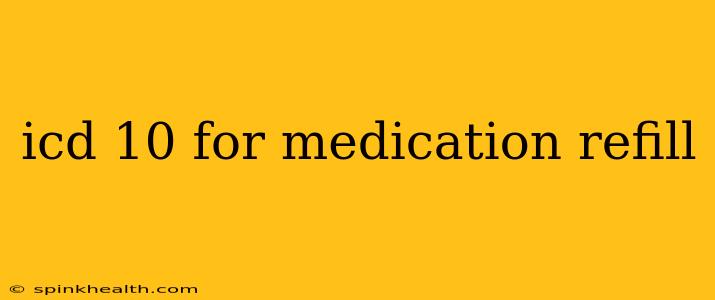The ICD-10 Code Conundrum: Why There Isn't One for Medication Refills
Let's start with a simple truth: There isn't a single ICD-10 code specifically for "medication refill." This isn't a quirk of the system; it's by design. ICD-10 codes classify diseases and injuries, not administrative actions like filling a prescription. Think of it like this: ICD-10 codes tell the story of why a patient needs medication, not the act of obtaining it.
The confusion often stems from the fact that healthcare professionals need a way to track and code the reason a patient is seeking a medication refill. This isn't about the refill itself, but the underlying medical condition necessitating continued treatment.
What ICD-10 Codes Are Used in Relation to Medication Refills?
The appropriate ICD-10 code depends entirely on the diagnosis for which the medication is prescribed. For example:
- Hypertension (High Blood Pressure): If a patient is refilling their blood pressure medication, the relevant ICD-10 code would be the one specific to their hypertension (e.g., I10 for essential (primary) hypertension).
- Diabetes Mellitus: For someone refilling insulin or oral diabetes medication, the code would reflect their specific type of diabetes (e.g., E11 for type 2 diabetes).
- Asthma: If a patient is refilling their inhaler, the ICD-10 code would reflect their asthma diagnosis (e.g., J45 for asthma).
How Healthcare Professionals Handle Medication Refills in Billing and Coding
While there's no code for the refill itself, the physician's encounter is coded based on the ongoing management of the patient's condition. This might include:
- Routine follow-up visit: A code indicating the physician reviewed the patient's condition, adjusted medication as needed, and approved the refill.
- Medication management: Codes reflecting the physician's time spent managing the patient's medication regimen, including assessing efficacy, side effects, and making adjustments.
The billing process often involves separate codes for the medication itself (provided by the pharmacy), and the physician's services related to the patient's ongoing care.
What if a Patient Only Needs a Refill, Without a Doctor's Visit?
In some cases, state regulations allow for medication refills without a physician's visit, especially for chronic conditions. In these scenarios, no ICD-10 code is needed from the physician. The pharmacy uses the existing diagnosis code from the original prescription.
Is there a separate code for medication non-compliance?
No, there isn't a specific ICD-10 code for medication non-compliance. However, the physician might use a code that reflects the consequences of non-compliance, such as an exacerbation of the underlying condition. For instance, if a patient with hypertension doesn't take their medication, and their blood pressure rises significantly, the physician might code the increased blood pressure.
Can I find the right ICD-10 code without a medical degree?
No. Choosing the correct ICD-10 code requires medical expertise and knowledge of the patient's diagnosis. Incorrect coding can lead to billing issues and inaccurate health data. Always rely on a qualified healthcare professional for coding purposes.
In summary, the lack of an ICD-10 code for "medication refill" underscores the fundamental difference between administrative procedures and clinical diagnoses. The focus should remain on accurately coding the patient's underlying condition to ensure proper medical record keeping and billing. If you have questions about coding a specific patient's situation, consult with a qualified medical coder.

